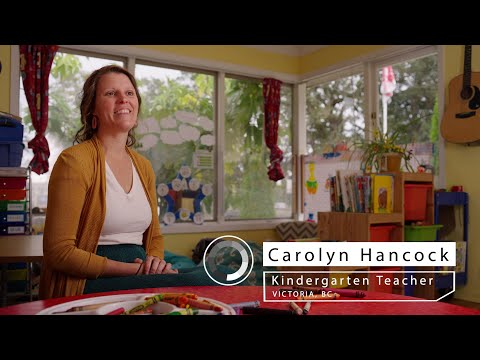Career Overview
Elementary school and kindergarten teachers work with children from kindergarten to Grade 7. They teach in core areas such as reading, writing and arithmetic. They may also teach physical education, music and other subjects. Some specialize in second-language instruction.
Job Titles
Duties
In general, elementary school and kindergarten teachers:
- Use a structured plan of lessons, discussions, audio-visual presentations and field trips along with flexible instruction based on students’ interests
- Prepare lessons based on approved curriculum and school district guidelines
- Provide or co-ordinate hands-on, practical learning experiences
- Lead students in activities to promote their physical, mental and social development
- Prepare, give and mark tests and assignments
- Monitor students’ progress and discuss with parents
- Identify children’s individual learning needs
- Manage various learning styles and behaviour types
- Work with educational assistants to modify lessons for students needing extra help
- Take part in staff meetings, conferences and teacher education workshops
Some may also:
- Assign and mark homework
- Supervise teachers’ aides and student teachers
Elementary school and kindergarten teachers may choose to focus on areas such as special education, counselling, music or physical education. Some teach English as a second language (ESL). Others teach in core French or French immersion programs or in B.C.’s francophone school system.
Earnings
Earnings is income that workers receive in exchange for their labour. Depending on the type of employment, earnings can be in the form of wages (hourly), salaries (fixed monthly or annual) or self-employed earnings.
Work Environment
# Workers Employed
33,690% Employed Full Time
76%Elementary school and kindergarten teachers work in public and private elementary schools. They do most of their work in the classroom. Out-of-classroom learning is also an important part of the job. They regularly take care of organizational tasks, prepare lessons and do marking on their own time, often at home.
Most teachers work a 10-month school year, with two months off in July and August. They also have holidays over Christmas and at spring break.
Elementary school and kindergarten teachers use computers to share lessons and information electronically with students and parents. They also teach students how to safely use computers and tablets for in-class work.
Teaching can be a highly rewarding job for those who like to help children. It can also be challenging. Teachers work with students with a variety of learning abilities and needs. They can be faced with difficult issues in the classroom. They may also feel the physical effects of standing and bending throughout the day.
Career Pathways
Some new graduates secure teaching contracts right away. But many begin their careers as full- or part-time teachers teaching on call (TTOCs). TTOCs fill in for teachers who are absent–whether for a few hours, a few days, or while taking maternity leave or sabbatical.
Experienced teachers may move on to become education consultants, vice-principals, principals or school district senior managers.
Occupational Interests
It’s important to understand what kinds of occupations align with your interests.
For more about occupational interests visit Skills for the Future Workforce > Characteristics.
Here are the top occupational interest(s) for this career profile:
Education, Training and Skills
Elementary school and kindergarten teachers need:
- A bachelor’s degree in education
- A provincial teaching certificate
- Past experience working with children or youth or volunteering in schools
Most teachers complete a bachelor's degree in the arts or sciences before earning their bachelor’s degree in education.
Teachers who specialize in special education or second-language instruction need additional training. Those who wish to teach English as a second language (ESL) or French immersion are assessed by their employer.
Education programs in B.C.

Top Skills
Every job calls for a certain set of skills. Knowing those skills is the first step in finding a good career fit.
Here, you will find the 10 most relevant workplace skills. Some are more important to achieving success in a certain career than others. These skills may come naturally to you or you may need to gain them through education, training and experience.
See the list of work-related skills below, ranked in order of importance for this career. Check out the list and see if this career matches your skills—take that first step!
Teaching others how to do something.
Choosing and using training, instructional methods and procedures appropriate for the situation when learning or teaching new things.
Talking to others to share information effectively.
Giving full attention to what other people are saying, taking time to understand the points being made, asking questions as appropriate, and not interrupting at inappropriate times.
Being aware of others’ reactions and understanding why they react as they do.
Understanding written sentences and paragraphs in work-related documents.
Keeping track of and assessing your performance, other individuals, or organizations to make improvements or take corrective action.
Using logic and reasoning to identify the strengths and weaknesses of alternative solutions, conclusions or approaches to problems.
Adjusting actions in relation to others' actions.
Communicating effectively in writing as appropriate for the needs of the audience.
Labour Market Statistics
Discover data, facts and information that have been gathered and analyzed. Learn about the characteristics of the economy and labour market in B.C.
Employment
Find out about employment types and trends by region and industry.
Employment
33,690Employment by Region







| Region | Employment | % Employment of this Occupation |
|---|---|---|
| Cariboo | 1,095 | 3.2% |
| Kootenay | 1,145 | 3.4% |
| Mainland/Southwest | 20,045 | 59.5% |
| North Coast and Nechako | 975 | 2.9% |
| Northeast | 740 | 2.2% |
| Thompson-Okanagan | 3,960 | 11.8% |
| Vancouver Island/Coast | 5,735 | 17.0% |
Labour Market Outlook
The B.C. Labour Market Outlook is a 10-year forecast of the expected supply and demand for labour in the province. It’s usually updated every year. The purpose is to provide British Columbians with the knowledge to make informed decisions on careers, skills training, education and hiring.
Forecasted Job Openings (2025-2035)
9,550Forecasted Job Openings
Forecasted Employment Growth Rate
Composition of Job Openings
Job Openings by Region (2025-2035)







| Region | Job Openings | Avg. Annual Employment Growth |
|---|---|---|
| Cariboo | 190 | -0.9% |
| Kootenay | 440 | 0.3% |
| Mainland/Southwest | 5,320 | 0.1% |
| North Coast and Nechako | 170 | -0.7% |
| Northeast | 190 | 0.2% |
| Thompson-Okanagan | 1,360 | 0.3% |
| Vancouver Island/Coast | 1,870 | 0.1% |
Industry Highlights
Learn about the opportunities in B.C.'s major industries, including employment trends, earning potential, locations of work and more.
Forecasted Job Openings by Industry
| Industry | Job Openings (2025-2035) |
|---|---|
| Educational Services | 9,470 |
| Public Administration | 40 |
| Health Care and Social Assistance | 20 |
| Repair, Personal and Non-Profit Services | 20 |
| Professional, Scientific and Technical Services | 10 |
Insights from Industry
Elementary school and kindergarten teachers enjoy strong job prospects.
Demand is especially high for French immersion and francophone program teachers who usually find teaching contracts in their first year of work. Demand is also very strong for teachers in rural areas.
Resources
-
B.C. Ministry of Educationwww.gov.bc.ca/bced
-
British Columbia Public School Employers’ Association (BCPSEA)bcpsea.bc.ca
-
Canadian Teachers’ Federationctf-fce.ca
-
EdCan Network, Canadian Education Associationwww.edcan.ca
-
Education Canada Network (ECN)www.educationcanada.com
-
Make a Future: Careers in BC Educationwww.makeafuture.ca
-
Teacher Regulation Branch – B.C. Ministry of Educationteacherregulation.gov.bc.ca








